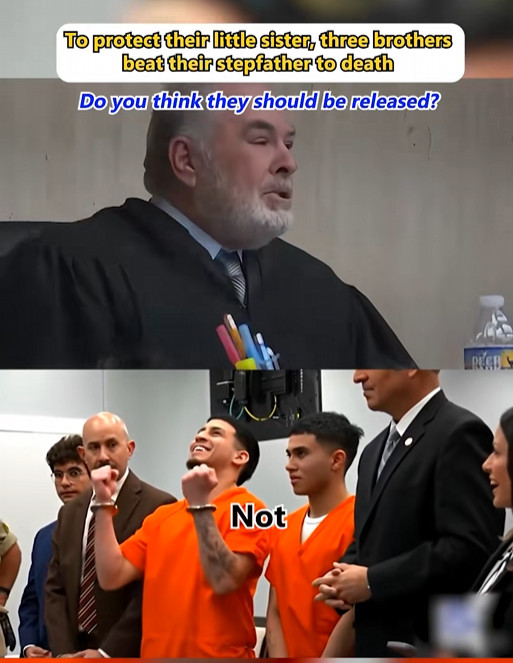The Tragic Tale of Vigilante Justice in South Texas
In January 2022, a profound and disturbing incident unfolded in Pharr, Texas, involving two brothers, Alejandro and Christian Treviño, who found themselves embroiled in a tragic confrontation that resulted in the death of their stepfather, Gabriel Quintanilla. This harrowing case captivated the nation, revealing deep-seated issues related to familial relationships, the complexities of vigilantism, and the profound impact of alleged abuse within a family. As details emerged, the case raised not only legal questions but also stirred significant public sympathy for the brothers, who many perceived as defenders of their vulnerable younger sister.
Allegations and the Fatal Confrontation
The roots of this tragic incident can be traced back to shocking allegations of sexual abuse involving Quintanilla and the Treviños’ 9-year-old half-sister. Reports surfaced indicating that the abuse was initially disclosed by the minor’s testimony regarding inappropriate interactions that allegedly transpired at an RV park. This alarming revelation prompted an overwhelming emotional response from the brothers. When Alejandro, then 18, and Christian, who was either 17 or 18 at the time, learned of these allegations, their sense of justice took a drastic turn as they resolved to confront their stepfather about his alleged misconduct.
The confrontation soon escalated into a violent altercation. Quintanilla’s attempt to evade accountability resulted in a physical struggle as the brothers, accompanied by a family friend named Juan Eduardo Melendez, pursued him. What initially began as a confrontation to address serious allegations spiraled into a brutal beating filled with rage and desperation. Eyewitness accounts and evidence suggest that Quintanilla was subjected to multiple assaults, with the brothers reportedly using brass knuckles during the attack. The aftermath of this violent encounter was grim; they placed his lifeless body in the bed of a pickup truck and abandoned it in a nearby field, where it was discovered by a farmer shortly after. This shocking culmination of events highlights the tragic consequences of vigilantism driven by emotion and a sense of duty to protect.
Legal Consequences and Charges Faced
The violent altercation led to significant legal repercussions for the involved parties. Both Christian Treviño and Juan Eduardo Melendez faced serious charges, including capital murder, aggravated assault, and participation in organized criminal activity. These charges marked a pivotal moment in their lives as they confronted the consequences of their actions. Alejandro Treviño, who reportedly did not deliver the fatal blows, faced lesser charges of aggravated assault and organized criminal activity. The legal implications of this case underscore the complexities that arise when familial loyalty intersects with the law, particularly in situations involving perceived justice for victims of abuse.
The Backstory of Gabriel Quintanilla
Adding another layer to this tragic narrative, further investigation revealed that Gabriel Quintanilla had an active warrant for continuous sexual abuse of a child dating back to 2019. This shocking information came to light during the investigation and significantly heightened public outrage surrounding the case. Quintanilla had managed to evade law enforcement for years, living under the shadow of these allegations until his untimely demise. The realization that he was a known abuser, coupled with the brothers’ desperate attempt to protect their sister, contributed to the perception of their actions as a form of vigilante justice. Many in the community viewed the brothers’ extreme actions as a desperate measure to safeguard their sister from ongoing trauma, shedding light on the complexities of justice in the face of familial abuse.
Public Reaction and Support
The incident triggered a significant reaction from the public, igniting discussions about the nature of justice and the moral implications of vigilantism. Numerous petitions advocating for leniency towards Alejandro and Christian Treviño circulated online, amassing hundreds of thousands of signatures. This groundswell of support indicates widespread empathy for the brothers and their motivations. Many individuals expressed an understanding of their desperate actions, framing them as a necessary response to protect their sibling from a known abuser. Public figures, including former judge Charles “Big Angry” Adams, weighed in on the matter, asserting that most people could relate to the brothers’ intentions, particularly given the distressing nature of the allegations. The support from the community catalyzed further discourse about the challenges faced by victims of domestic abuse and the psychological impacts of living in fear within one’s own home.
The Future of the Treviño Brothers
As the case evolved, both Christian and Alejandro, who had by then reached adulthood, appeared in court in February 2023. During this proceeding, their bond amounts were reduced to $150,000, and both entered not guilty pleas. Meanwhile, Juan Eduardo Melendez had already been released on bail in August 2022, further sparking discussions about the fairness of the legal system in handling cases of this nature. The ongoing trial is expected to meticulously dissect the nuances of their actions, the concept of self-defense, and the overarching theme of justice versus vigilantism. With the potential for substantial consequences looming, the brothers’ future remains uncertain, yet their case continues to resonate with many who grapple with the question of how far one should go to protect family.
This tragic case serves as a stark reminder of the delicate balance between justice and law, particularly in situations where familial loyalties collide with legal responsibilities. The Treviño brothers’ story not only highlights the lengths individuals might go to protect their loved ones but also the devastating consequences that can arise from such actions. As the judicial process unfolds, it is clear that the implications of this case will reverberate throughout the community and beyond, prompting ongoing discussions about justice, family, and the rights of victims. The intersection of personal tragedy and legal accountability is a complex tapestry, woven with emotions that challenge our perceptions of morality and justice in a world grappling with the darker sides of human behavior.
https://vm.tiktok.com/ZMA2HrEuf/
















